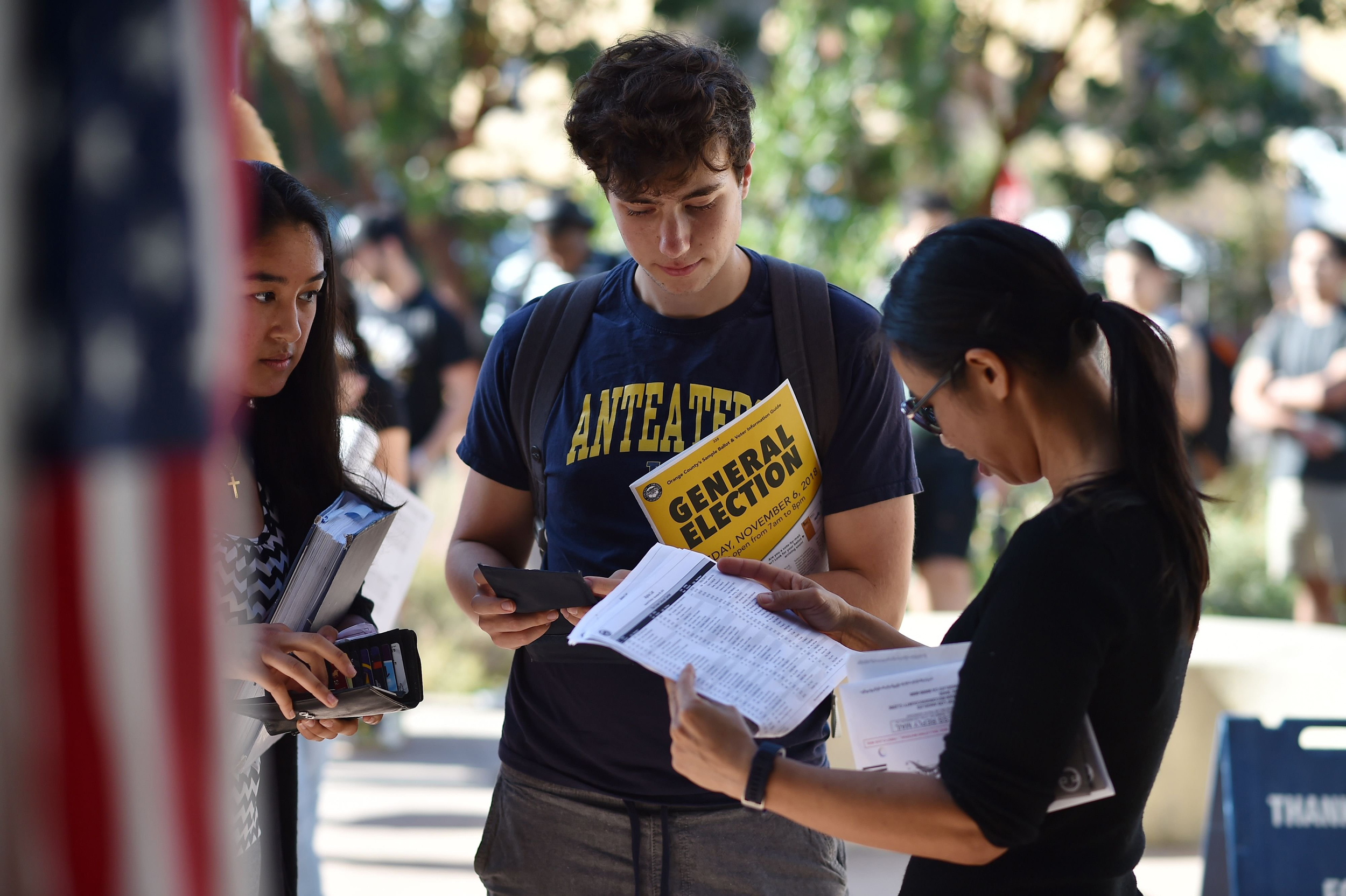
rewrite this content and keep HTML tags
The December Emerson College Polling survey has unveiled intriguing insights, painting a vivid picture of the preferences and concerns of voters under 30. This demographic, often considered a pivotal force in shaping electoral outcomes, is navigating a complex intersection of economic worries, shifting political dynamics, and a reliance on social media. The survey reveals President Donald Trump commanding significant support among this demographic.
The latest data is bad news for President Biden who has spent his time in office inviting Gen Z social media influencers to the White House and touting student loan debt forgiveness in attempts to incentivize young voters. Biden is trailing at 43% to Trump’s 47% with voters nationally. This month’s survey oversampled young voters to better understand their changes in attitude toward President Biden.
Spencer Kimball, who serves as Executive Director of Emerson College Polling, said, “In the oversample of voters under 30, 45% support Biden and 40% support Trump in a head-to-head matchup, while 16% are undecided. Within this group, there is a divide between voters under and over 25. Of voters under 25, 48% support Biden and 35% Trump, while voters between 25 and 29 are split: 44% support Trump and 42% support Biden.”
Economic issues loom large in the minds of voters, with 38% of all voters citing it as their top issue. However, among voters under 30, this concern intensifies, with 44% identifying the economy as the most critical problem facing the United States. An open-ended response reveals that terms like ‘inflation,’ ‘economy,’ and ‘money’ dominate the discourse, underlining the financial unease among the younger demographic.
A staggering 76% of voters under 30 believe their parents’ generation had superior economic opportunities, reflecting a pervasive sentiment of diminished prospects among the youth. This sentiment progressively wanes with age, suggesting a growing generational disconnect. Spencer Kimball, Executive Director of Emerson College Polling, concludes that financial concerns and emotional strain related to the cost of living are influencing the perception of President Biden’s leadership among younger voters.
Within this context, a significant revelation is Trump’s support among the youth, the oversample of voters under 30 included new voters who did not participate in 2020. Forty-three percent of these new voters support Trump in 2024 while 21% support Biden
President Biden’s approval rating stands at 41%, but it varies significantly among age groups. Notably, young voters between 18 and 24 express a lower approval rate of 35%, indicating a disconnect of young voters with the Biden administration. The handling of the situation in Israel emerges as a notable concern among younger voters, impacting their perception of Biden’s leadership. Voters under 25 are most likely to rate Biden’s handling of the situation in Israel as ‘poor’ at 44%, and are least likely to rate his handling as excellent/good at 24%.
In the 2024 Republican Primary, Donald Trump maintains a commanding lead with 64% support, highlighting his enduring appeal among Republicans. Importantly, Trump’s support among young Republicans under 30 exceeds the average, reaching an impressive 73%. Among Democrats under 30, Biden’s support is lower than the average of 63% of Democrat primary voters at 56%, while 12% support Marianne Williamson, and 5% support Dean Phillips. Twenty-eight percent are undecided.
Kimball observes a notable trend: as younger Democrats distance themselves from Biden, Trump’s backing within the Republican primary strengthens, presenting a challenge for Biden to retain the youth vote.
The survey delves into the evolving landscape of media consumption, showcasing a significant age-based divide. While cable or network news gains prominence with age, social media emerges as the primary news source for voters under 30. A staggering 62% of young voters rely on platforms like Twitter, Instagram, and TikTok as their primary source for news and information. This trend reinforces the influence of social media in shaping political narratives among the youth.
Among social media platforms, TikTok stands out with 78% of voters under 30 using it at least several times every two weeks. Trump’s formidable presence on digital platforms could be contributing to this trend, considering his engagement with online audiences during and after his presidency. The data underscores the changing dynamics of information consumption, with younger generations favoring digital platforms for news and updates.
65% of those under 30 use X (formerly known as Twitter) at least several days over two weeks, compared to 53% of those in their 30s, 44% of those in their 40s, 31% of those in their 50s, 20% of those in their 60s, and 8% of those over 70.
Instagram is more used by young voters: 82% of those under 30 use it at least several times every two weeks. 73% of those under 30 also use Facebook at least several times every two weeks.
Exploring anxiety levels among voters, the survey reveals a higher prevalence among younger demographics. An alarming 81% of voters under 25 experience feelings of nervousness, anxiety, or being on edge at least several days a week. This decreases with age, underlining the challenges faced by young people in navigating the uncertainties of the present and future.
The Emerson College Polling survey paints a vivid portrait of the political landscape, with Donald Trump maintaining robust support among young voters. As the 2024 elections approach, understanding these nuanced preferences becomes pivotal for political strategists aiming to resonate with the voices shaping America’s political future.
The post Donald Trump’s Resonance with Young Voters: Social Media, Economic Anxieties, and Political Shifts appeared first on Stephen K Bannon’s War Room.